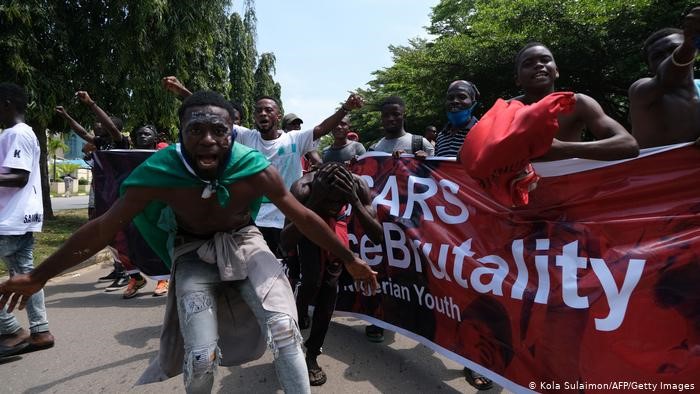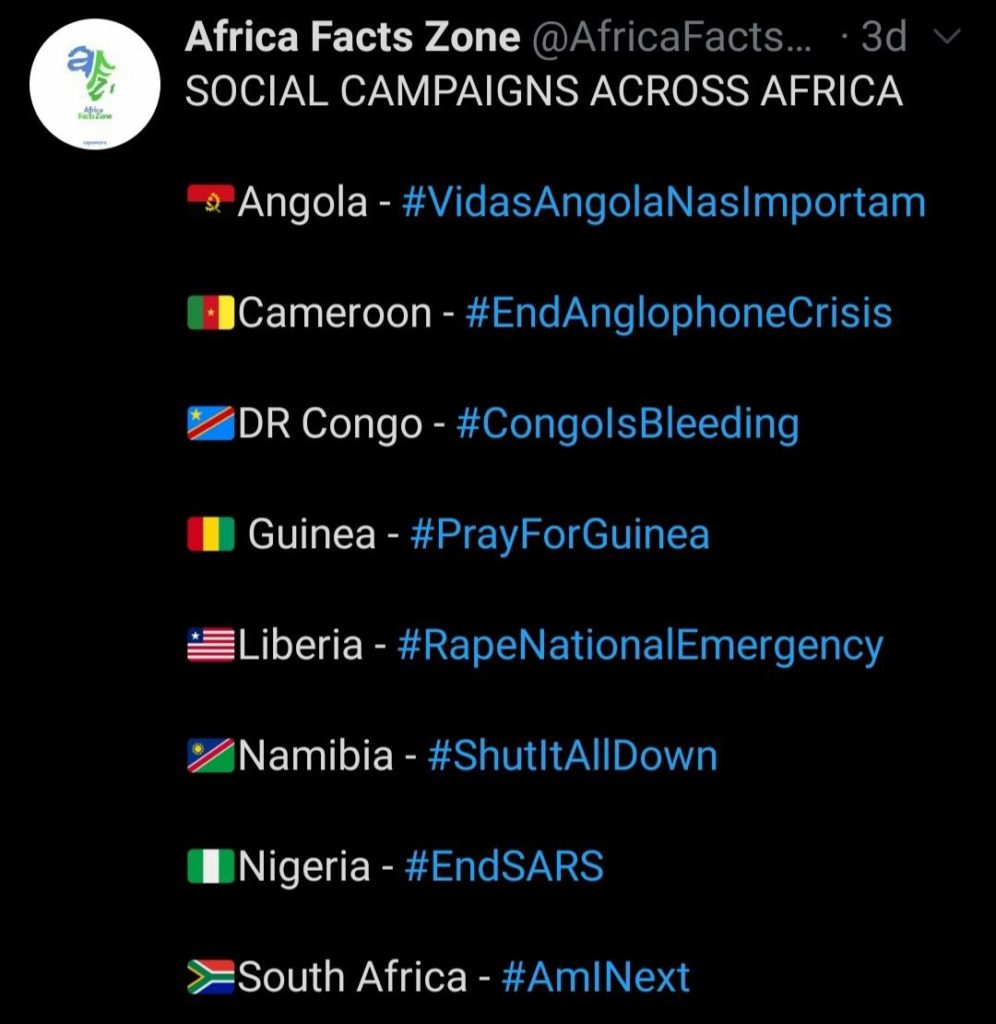How #EndSARS Inspired, Bolstered Similar Campaigns Across Africa

Physical demonstrations against police brutality in Nigeria that went on for about two weeks in October appear to have encouraged similar campaigns in other African countries. The campaign was famously driven on social media as well with #EndSARS and similar hashtags trending continuously for many days.
After a day protest was held in 2017 under the #EndSARS campaign, calling for an end to the notorious police unit, the Special Anti-Robbery Squad (SARS), the government announced their disbandment. The squad’s activities, however, continued. On October 3, a video was uploaded on Twitter that showed SARS officers appearing to drive away after shooting a young man and leaving his body by the roadside.
This triggered a wave of agitation, leading to the youth-led protests, arguably unprecedented in recent Nigerian history. The movement received a lot of attention across the globe, thus building up a level of hope in other youth populations across the continent in relation to similar problems.

The Anglophone region of Cameroon has been experiencing armed violence between the military and armed groups since 2016. Aka Kuneo, a Cameroonian, told HumAngle schools have been shut down in the English-speaking part of the country, so people who could afford it went to school in the French-speaking region. When schools finally resumed in October, students were reported killed. At least eight school kids were murdered on Saturday, October 24, at Mother Francisca International Bilingual Academy, located in the city of Kumba.
The following Monday, the hashtag #EndAnglophoneCrisis began to trend on social media, with the country’s youth condemning police brutality among other ills and calling for the intervention of the international community.
Kuneo believes that when the anti-police brutality demonstrations in Nigeria gave Cameroonians courage to speak up. “Cameroon is not a place for freedom of speech. People get arrested for saying things against the government online, internet connections get cut off. So, people are reluctant to speak up, but Nigerian youth inspired them,” he explained.
He, however, does not see the possibility of the protests spilling over to the streets anytime soon. “There is a law in Cameroon that states that for any protest to happen, permission must be sought and granted by the government,” he said.
Caleb Okereke, Kampala-based managing editor of Minority Africa, told this paper police brutality had always been present in Uganda but it became even more prominent during the COVID-19 pandemic.
“There was a dusk to dawn curfew obviously because there were lockdown measures to enforce. Although it is present, police brutality is very classist in Uganda people are disproportionately affected,” he noted.
After the hashtag #EndPoliceBrutalityInUganda started to gain traction, Ugandan comedian, Patrick Salvado, took to his Twitter page to urge people against “jumping on every bandwagon of a trending global topic to seem relevant”.
“Our police is not perfect without a doubt but the #EndPoliceBrutalityInUganda is far-fetched,” he argued.
Okereke said a university student was allegedly killed in July 2020 by a unit of the police called Local Defence Unit (LDU), which has become notorious for beating up people.
The actions of the officers became crueller during the lockdown according to human rights lawyers who called for its disbandment.
Although EndSARS is an inspiration to youth in Uganda now speaking up against police brutality, it is not the sole inspiration as there had been similar protests in the past. In November 2019, the police in Uganda’s capital fired tear gas at a group of journalists who had gathered to protest alleged brutality.
The group of about 50 journalists had gathered at Kampala’s city centre to march to the police headquarters and deliver a petition to the chief of police. The petition asked authorities to investigate and reprimand officers found guilty of assaulting journalists and to stop police brutality in the field.
Ugandan authorities often take issues with protest and arrest demonstrators. Caleb recounted his own experience when he was arrested in March for participating in the Black Lives Matters campaign, which was not even a protest against the government.
Based on his experience, he does not see Ugandans taking the anti-police brutality movement to the streets yet.
“People will surprise you,” he, however, added. “If someone would have asked me years ago if I see Nigerians hitting the street in such magnitude I would have said no but a revolution is definitely possible but I do not know what will be that tipping point for now Ugandans.”
In many other countries across Africa, the police is an institution that instils fear in the people because of a track record of torture and inhuman treatment. A lady reportedly drowned to death in Nairobi, Kenya, as she was afraid the police would maltreat her for violating an existing curfew.
“Police brutality has always been prominent in Kenya, especially in 2017, post-election. It has also been part of the fabric of this government but it has been better since 2012. We have had a lot of police reforms plus a new constitution but we are still miles away from bad governance,” observed Troy Onyango, Kenyan-based creative writer and founder of Lolwe.
Kenya’s The Standard reported that Moraa Nyarangi, a class four pupil at Mathare Primary School in Nairobi, was killed by a bullet fired by anti-riot police during running battles with National Super Alliance (NASA) supporters. Nyarangi was playing with her peers on the third-floor balcony of their one-roomed house in Mathare Area 2 when she was hit on the chest. She died on the spot.
“There were a lot of agitations and street protests when it happened but currently people are not hitting the street because of the Covid19 restrictions and police are fully on ground,” Onyango said.
Hollywood actress, Lupita Nyong’o, took to Twitter to condemn police brutality in Nigeria and her home country, Kenya. Supporting the End SARS movement, she said, “I echo the declaration of the people of Nigeria to end police brutality and the call for their lives to be valued by the leaders of their nation.”
“Last week, the world saw this call answered with the wounding and murders of Nigerians in Lekki. I so badly want the end of this kind of violence and abuse of authority for Nigeria, for my own country, Kenya, and for the country, I live in now, USA,” she added in a series of tweets posted on October 28.
“It seems that this is the resounding battle cry of 2020 across the globe, to have police powers reevaluated, their organisation held accountable and systems rebuilt to serve the people.”
Onyango, in his chat with HumAngle, said “Kenya was known as the hub of peace in East Africa till the post election violence in 2017, which started the conversation around police brutality and reform.”
“I have to give credit to Boniface Mwangi and also feminists in Kenya who have been advocating against police brutality. I do not want to erase their work but there is more to be done to address police brutality collectively as a nation.”
Onyango is one of few Africans who have had first-hand experience with police brutality both in Kenya and Nigeria. In 2018, when he visited the latter country for the first time, he had four encounters with operatives of the Special Anti-Robbery Squad within one month.
In one of those encounters, he was stopped by an officer while on a motorcycle and heading to a restaurant with his laptop. He was asked if he was a “Yahoo boy” and answered that he worked as a journalist.
“And that was what saved me,” he said.
In another incident in Ibadan, Oyo State, the SARS operatives went through his iPhone, checked his gallery and emails, and saw his engagements with international non-governmental organisations which he freelanced for at the time. He was again accused of being a fraudster and was grilled for half an hour. He had to explain he was Kenyan and was only in Nigeria for a writer’s residency programme.
With an average age of 20 years, Africa is the region with the youngest population worldwide. And so the youth are easily noticed when they unite against government policies affecting them. Many of them hope their governments would listen intently and spring into action to address their needs whenever that happens. But, so far, that does not seem to be the trend.
Support Our Journalism
There are millions of ordinary people affected by conflict in Africa whose stories are missing in the mainstream media. HumAngle is determined to tell those challenging and under-reported stories, hoping that the people impacted by these conflicts will find the safety and security they deserve.
To ensure that we continue to provide public service coverage, we have a small favour to ask you. We want you to be part of our journalistic endeavour by contributing a token to us.
Your donation will further promote a robust, free, and independent media.
Donate HereStay Closer To The Stories That Matter




